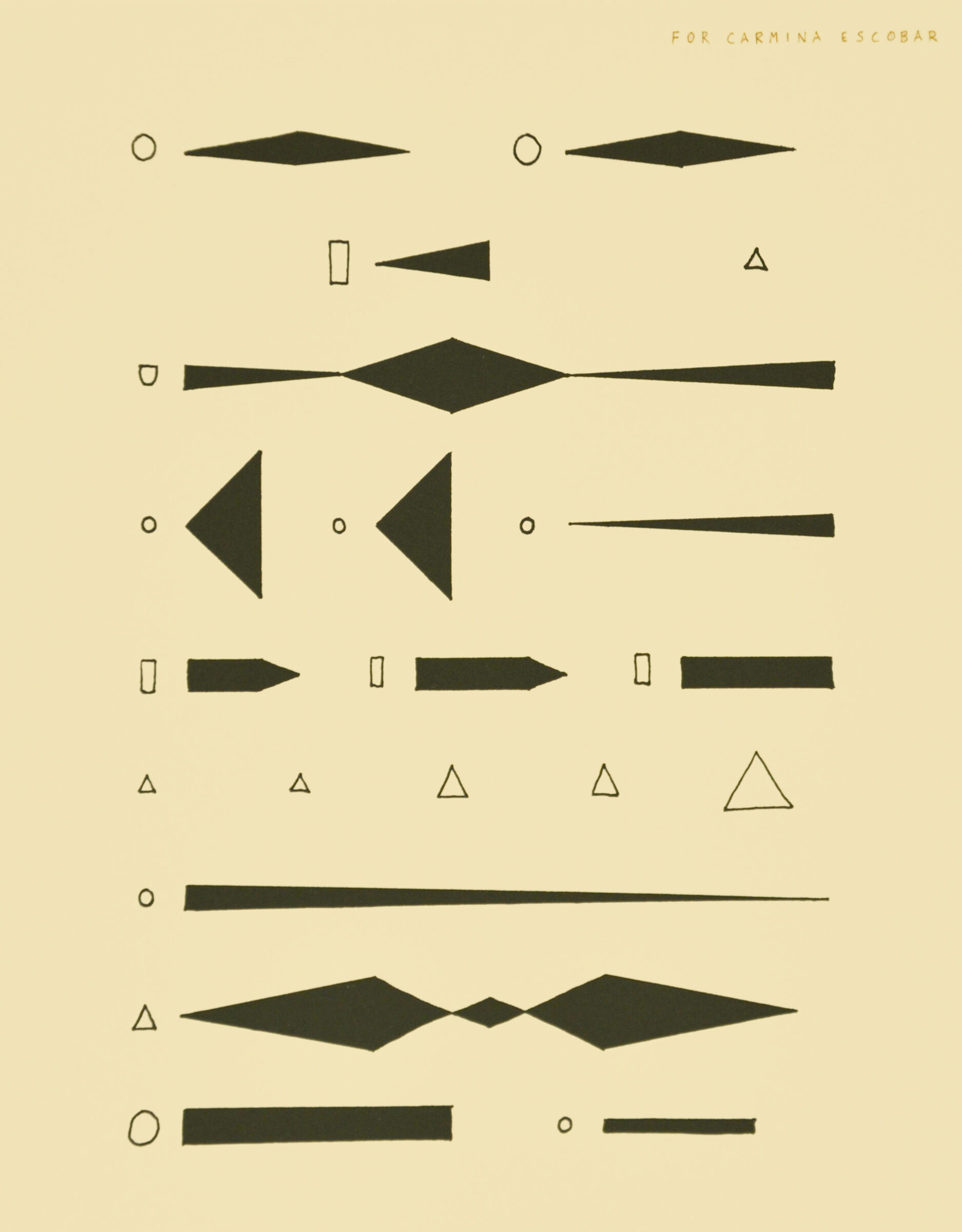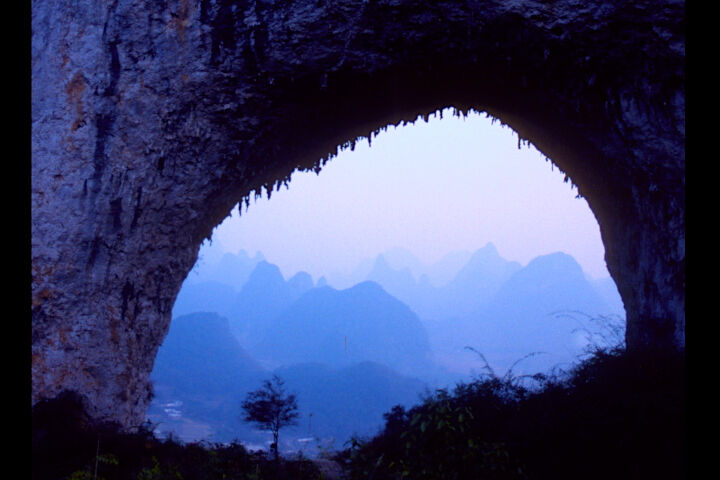Raven Chacon: For Zitkála-Šá
Sat, July 16, 2022
4 pm
This event has passed.
See more events like this.
Become a member today!
Join now to enjoy early access to exhibitions and events, unlimited free admission, guest privileges, and more.
Join nowThe Susan and John Hess Family Theater is equipped with an induction loop and infrared assistive listening system. Accessible seating is available.
Face coverings are required to attend this event. All attendees ages two and older must wear face coverings that cover the nose and mouth.
Learn more about access services and programs.
Floor 3, Theater
From 2017 to 2020, Raven Chacon (b. 1977, Fort Defiance, Navajo Nation) created a series of thirteen lithographs, For Zitkála-Šá—graphic scores dedicated to contemporary American Indian, First Nations, and Mestiza women working in music performance, composition, and sound art. Chacon envisioned the scores as portraits of the women and how they navigate the twenty-first century. The artist drew on a range of symbols, including Western music notation, tribal geometries, symbology, and numerology, among more ambiguous designs. Chacon’s scores will be activated in this performance and are also on view in the 2022 Whitney Biennial, along with the artist’s video, sound, and photography works.
Saturday, July 16
4 pm
7:30 pm
The title of the series refers to the Yankton Dakota composer and musician Zitkála-Šá, who lived from 1876 to 1938. As Chacon has written, “In the early twentieth century [Zitkála-Šá] was known as a composer, writer, editor, teacher, and political activist. Several of her works chronicled her early struggles with identity; as an orator, many of her speeches brought awareness to the systemic oppression of Native people. As a composer and musician, Zitkála-Šá taught violin, later writing the libretto and songs for The Sun Dance Opera (1913), the first American Indian opera.”
Tickets are required ($25 adults; $18 students, seniors, and visitors with disabilities; $12 for Members). Doors open thirty minutes before the program begins. Ticket holders are guaranteed admission until the start of the program, at which time any unclaimed seats will be released. Tickets cannot be refunded or exchanged.
Performers
- Autumn Chacon
- Carmina Escobar
- Joy Harjo
- Candice Hopkins
- Suzanne Kite
- Koyoltzintli (performing For Barbara Croall)
- Cheryl L’Hirondelle
- Ange Loft
- Laura Ortman
- Heidi Aklaseaq Senungetuk
- Olivia Shortt
- Jacqueline Wilson
Raven Chacon is a Pulitzer Prize–winning composer, performer, and installation artist from Fort Defiance, Navajo Nation. As a solo artist, collaborator, and a member of Postcommodity from 2009 to 2018, Chacon has exhibited, performed, or had works performed at the Los Angeles County Museum of Art; The Renaissance Society, Chicago; San Francisco Electronic Music Festival; REDCAT, Los Angeles; Vancouver Art Gallery; Haus der Kulturen der Welt, Berlin; Borealis Festival, Seattle; SITE Santa Fe; Chaco Canyon, New Mexico; Ende Tymes Festival, New York; The Kennedy Center, Washington, D.C.; Whitney Biennial, New York; documenta 14, Athens and Kassel; Carnegie International, and Carnegie Museum of Art, Pittsburgh.
Since 2004, he has mentored more than three hundred Native high school composers in writing new string quartets for the Native American Composer Apprentice Project (NACAP). Chacon is the recipient of a United States Artists Fellowship, a Creative Capital Award, Native Arts and Cultures Foundation Artist Fellowship, the American Academy’s Berlin Prize, the Bemis Center’s Ree Kaneko Award, and the Pew Center for Arts & Heritage’s Fellowship-in-Residence.
Autumn Chacon (Diné/Chicana) is an artist and activist. Her organizing work in media justice led to the inception of three FCC-licensed community radio stations, and her activism led to meetings with the world’s largest banks in a successful effort to divest $3.8 billion from the Dakota Access Pipeline. Her work as a conceptual, installation, and performance artist has been shown among First Nations communities throughout North America and abroad. Many of Chacon’s pieces reveal Indigenous futurisms where technology has a sacred relevance and exemplify her skills as a self-taught electronics engineer.
Carmina Escobar is an extreme vocalist, improviser, filmmaker, and sound and intermedia artist based in Los Angeles. Escobar investigates and expresses emotions, memory spaces, states of alienation, and the possibilities of interpersonal connection. Her work, spanning voice performances, installations, experimental theater, interdisciplinary collaboration, new technologies, and video and film pieces, challenges our understanding of musicality, gender, queerness, race, and the foundations of human communication. An immigrant from Mexico, exploring interstitial states of being—suspensions between worlds, politics, and borders—is key to her practice.
Joy Harjo, the twenty-third Poet Laureate of the United States, is an internationally renowned performer and writer of the Muscogee (Creek) Nation. Harjo is the author of nine books of poetry, several plays, children’s books, and two memoirs; she has also produced seven award-winning music albums. Her many honors include the Ruth Lilly Poetry Prize from the Poetry Foundation, the Academy of American Poets’ Wallace Stevens Award, two National Endowment for the Arts Fellowships, a Guggenheim Fellowship, and a Tulsa Artist Fellowship. She is a Chancellor of the Academy of American Poets and Board of Directors Chair of the Native Arts & Cultures Foundation. She lives in Tulsa, Oklahoma.
Candice Hopkins is a citizen of Carcross/Tagish First Nation and lives in Red Hook, New York. Her writing and curatorial practice explore the intersections of history, contemporary art, and Indigeneity. She is Executive Director of Forge Project, Taghkanic, NY, and Senior Curator for the 2019 and 2022 editions of the Toronto Biennial of Art. She was part of the curatorial team for the Canadian Pavilion at the fifty-eighth Venice Biennale, featuring the work of the media art collective Isuma; and co-curator of notable exhibitions including the national traveling survey Art for New Understanding: Native Voices, 1950s to Now; SITElines.2018: Casa Tomada, SITE Santa Fe; documenta 14, Athens and Kassel; and Sakahàn: International Indigenous Art, National Gallery of Canada, Ottawa. Notable essays include “The Gilded Gaze: Wealth and Economies on the Colonial Frontier,” in the documenta 14 Reader; “Outlawed Social Life,” in South as a State of Mind; and “The Appropriation Debates (or The Gallows of History),” in Saturation: Race, Art, and the Circulation of Value (New Museum/MIT Press, 2020).
Kite a.k.a Suzanne Kite is an Oglala Lakota performance artist, visual artist, and composer raised in Southern California. She holds an MFA from the Milton Avery Graduate School of the Arts at Bard College, Annandale-On-Hudson, NY, and is a Ph.D. candidate at Concordia University, Montreal, and Research Assistant for the Initiative for Indigenous Futures. Her research concerns contemporary Lakota ontologies through research creation, computational media, and performance practice. Recently, Kite has been developing a body interface for movement performances, carbon fiber sculptures, and immersive video and sound installations. She was a 2019 Pierre Elliott Trudeau Foundation Scholar and a 2020 Tulsa Artist Fellow.
Koyoltzintli is an interdisciplinary artist from the coast of Ecuador. She focuses on memory, reconnection, and nature through sound, collaborative processes, and personal narratives. Her work has been exhibited at the National Portrait Gallery, Washington, D.C.; United Nations, New York; Aperture Foundation, New York; and Paris Photo. She is the recipient of multiple awards, including fellowships from the musée du quai Branly – Jacques Chirac, Paris; NYFA, Mellon Foundation, Ford Foundation, and the U.S. Latinx Art Forum. Her first monograph, Other Stories, was published by Autograph ABP in 2017. Her work was featured in the 2021 book Latinx Photography in the United States: A Visual History by Elizabeth Ferrer. Koyoltzintli is a 2022 artist-in-residence at Socrates Sculpture Park, New York.
Cheryl L’Hirondelle (Cree/Halfbreed) is an award-winning interdisciplinary artist, singer-songwriter, and critical thinker whose Indigenous family roots are from Papaschase First Nation and Kikino Metis Settlement, Alberta. Her work investigates and articulates a dynamism of nêhiyawin (Cree worldview) in contemporary time-place, incorporating Indigenous languages, audio, video, VR, the olfactory, sewn objects, music, audience participation, and community engagement to create immersive environments and events towards “radical inclusion.” As a songwriter, L’Hirondelle focuses on both sharing nêhiyawêwin (Cree language) and Indigenous and contemporary song forms and personal narrative songwriting as “survivance” methodologies. In 2021, L’Hirondelle was awarded a Governor General’s Award in Visual and Media Arts from the Canada Council for the Arts.
Ange Loft is an interdisciplinary performing artist and initiator from Kahnawà:ke Kanien'kehá:ka Territory working in Tsi Tkarón:to. She is an ardent collaborator, consultant, and facilitator working in arts-based research, wearable sculpture, theatrical co-creation, and Haudenosaunee history. She is a vocalist with the music collective Yamantaka//Sonic Titan.
Laura Ortman (White Mountain Apache) is a soloist musician and composer creating across multiple platforms and is versed in Apache violin, piano, electric guitar, keyboards, and amplified violin. She has collaborated with artists such as Tony Conrad, Jock Soto, Raven Chacon, Nanobah Becker, Okkyung Lee, Martin Bisi, Jeffrey Gibson, Caroline Monnet, Tanya Lukin Linklater, Martha Colburn, and In Defense of Memory. She has performed at countless venues across the US, Canada, and Europe, including the Whitney Museum of American Art, Museum of Modern Art, the New School, and the New Museum, all in New York; imagineNATIVE Film + Media Arts Festival, Toronto; Toronto Biennial of Art; and the Centre Pompidou, Paris. In 2008, Ortman founded the Coast Orchestra, an all-Indigenous orchestral ensemble. Most recently, Ortman received a 2022 United States Artists Fellowship and 2022 Foundation for Contemporary Arts Grants to Artists award and was a participating artist in the 2019 Whitney Biennial.
Heidi Aklaseaq Senungetuk is a violinist and ethnomusicologist who explores Inupiaq music and dance and contemporary Indigenous music and art. Senungetuk earned degrees in violin performance at Oberlin College, Ohio, and the University of Michigan, Ann Arbor, and a Ph.D. in ethnomusicology at Wesleyan University, Middletown, CT. She has been a violinist with the Louisiana Philharmonic, the Tulsa Philharmonic, the Breckenridge Music Festival, and the Anchorage Symphony. Senungetuk contributed to the award-winning book Music and Modernity among First Peoples of North America (Wesleyan University Press, 2019) and teaches musicology and ethnomusicology at Emory University, Atlanta.
Olivia Shortt (Anishinaabe, Nipissing First Nation) is a Tkarón:to-based performing artist, sound artist, composer, noisemaker, troublemaker, and professional disrupter. Highlights include their debut at Lincoln Center for the Performing Arts, New York, in 2018; their film debut in Atom Egoyan’s 2019 movie Guest of Honour; and recording an album two kilometers underground in the SNOLAB in Ontario. Shortt won a 2020 Queer Emerging Artists Award from Toronto’s Buddies in Bad Times Theatre, was a finalist for the 2021 Toronto Arts Foundation Emerging Artist Award, and was featured in the winter 2020 issue of Musicworks magazine.
Dr. Jacqueline Wilson is a Yakama bassoonist, active performer, pedagogue, collaborator, and advocate. She currently serves as Assistant Professor of Bassoon at Washington State University and as Principal Bassoon of the Washington-Idaho Symphony, and she is on the faculty of the Lutheran Summer Music Academy, Valparaiso, IN. As an active soloist and chamber musician, she regularly presents recitals, masterclasses, and clinics nationwide. An eager contributor to the double reed community, Dr. Wilson currently serves as a Co-Executive Director of the Meg Quigley Vivaldi Competition and Bassoon Symposium and as Sponsor-a-Member Coordinator for the International Double Reed Society. She also co-hosts the Double Reed Dish podcast with oboist Dr. Galit Kaunitz.


